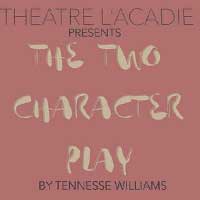
 [rating=2]Tennessee Williams wrote “The Two Character Play” in his later years when he became more bitter and scornful of the cards that he had been dealt in life. In Theatre L’Acadie’s revival of this lesser-known script, Felice (Daniel Westheimer) and his mentally fragile sister Claire (Emily Daigle) are perfectly cast in this memory play as lost and troubled souls, disconnected from reality yet immersed in its muck together. Their personal miseries are a series of broken chords, the most important of which is C# (i.e., “See sharp”). While this production can boast of superior acting, casting, and directing—thanks to director Kaitlin Eve Romero—no amount of talent can make up for a serious problem with the original script: There is no engine to drive character development. The lack of a plot causes the rogue duo to march in place with nothing to strengthen or change them. Watching the show is like listening to finger exercises on the piano: Even when the notes are well practiced and follow nicely in progression, the audience still begs for a tune.
[rating=2]Tennessee Williams wrote “The Two Character Play” in his later years when he became more bitter and scornful of the cards that he had been dealt in life. In Theatre L’Acadie’s revival of this lesser-known script, Felice (Daniel Westheimer) and his mentally fragile sister Claire (Emily Daigle) are perfectly cast in this memory play as lost and troubled souls, disconnected from reality yet immersed in its muck together. Their personal miseries are a series of broken chords, the most important of which is C# (i.e., “See sharp”). While this production can boast of superior acting, casting, and directing—thanks to director Kaitlin Eve Romero—no amount of talent can make up for a serious problem with the original script: There is no engine to drive character development. The lack of a plot causes the rogue duo to march in place with nothing to strengthen or change them. Watching the show is like listening to finger exercises on the piano: Even when the notes are well practiced and follow nicely in progression, the audience still begs for a tune.
The brother and sister project their innermost thoughts and conflicts into a presentation before a fictional audience: a play within a play, representing the illusion of life. What exactly is real, and what is not? It is this escape into a totally imaginary world that becomes the means by which we, the real audience, get to know them and the horrid reality of memories that their locale brings. We never really know if they have been deserted by their acting troupe or whether their creation of “The Two Character Play” is eventually meant for public consumption or whether it is simply something to occupy their time as they move aimlessly towards an ill-defined future. What we do know is that both are haunted by their collective past and crave to produce something meaningful if only for a moment.
Their reality is stark. Both reside in their family house, a locale where both of their parents died senselessly, one by murder and the other by suicide. We learn that their father shot and killed their mother and then shot himself and died. Both are extremely traumatized by their parents’ sudden deaths. The revolver is still hidden in the living room; the ammunition was once replaced with blanks—and now Felice swaps out the blanks with real bullets. They dispute whether the life insurance company should be told the facts—that it was their father who killed their mother and then committed suicide—because then they won’t be able to lay claim to his benefits. But if they twist the story around and argue that it was their mother who actually killed their father and then shot herself, then they would be able to put in a claim. Because the siblings are so far removed from reality, things that don’t make sense in the real world make sense in their imagination. No insurance company in their right mind would have claims adjusters release financial payments to heirs without first examining autopsy and police reports. So whatever lies that the adult children would dream up could most easily be found out.
This is not one of Tennessee Williams’ most performed plays, and there is a reason for it: It is dark and draining. As we watch the siblings become more and more frustrated and angry with each other, we fear for their emotional state and their lives. Tension builds in the audience. Yet the show is much too impressionistic to hold our sustained attention. The strain between tension and attention becomes a paradox.
Much like his more famous “The Glass Menagerie”, playwright Tennessee Williams thrusts himself into the character of Felice, simultaneously that of a reprobate and the adult in the room. Westheimer looks phenomenally like the playwright with his nicely groomed mustache; what a plus! Claire’s part is akin to the mentally disturbed sister in “Menagerie” (resembling the playwright’s sister in real life), and Daigle has gotten Claire’s flightiness, flakiness, and sensibilities down pat. How these siblings have survived through adulthood living in such a dysfunctional family is a mystery, except that we learn that each had been confined for some amount of time in a mental institution (although we are not sure if this was also a prison in Felice’s case).
As we watch a one-hour-and-forty-minute play (with a twenty-minute intermission) that deals with the larger theme of mental illness and trauma, we note that there is a lot of talking, a lot of musing, and a good number of disconnected ideas and recollections. Some parts are funny and nonsensical, if not also whimsical, while other parts are horribly violent and sad. Creating a play about fears and mutual goals appears to be a catharsis for both characters (as it most likely was for Williams when he wrote and rewrote the script). Solid acting makes the characters authentic and believable. But towards what end?
Yet “The Two Character Play” is perfect for these uncertain and strange times when most of us are wallowing in confusion and despair—and even panic—with the break in our usual routines and the encroaching coronavirus. The show successfully deals with impending doom, whether self-imposed or from external sources. It puts you on edge and ironically into the role of the characters on stage, who do not have a clue where life is going and what is going to happen next.
Theatre L’Acadie’s “The Two Character Play” is currently at The Athenaeum Theatre, 2936 N. Southport Avenue, Chicago. The show was originally scheduled to play through March 29, 2020. Check the internet for updates at www.athenaeumtheatre.org.
Tickets are $25 for general admission, and $15 for industry tickets.
Assuming that performances will take place in the near future, the schedule is:
Wednesday, Thursday, Friday, Saturday – 8:00 p.m.
Sunday – 3:00 p.m.
For tickets or more information, call the box office at 773-935-6875 or go to www.athenaeumtheatre.org.
Group rates are available to those who inquire and can be ordered online at https://web.ovationtix.com/trs/pr/1022908
To see what others are saying, visit www.theatreinchicago.com, go to Review Round-Up and click at “The Two Character Play”.






More Stories
” A Jukebox for the Algonquin”
“The Da Vinci Code”
“Titanic the Musical”